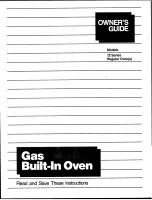
Consumer Support
Troubleshooting T
ips
Operating Instructions
Safety Instructions
9
Using the microwave features.
Make sure the turntable support and glass
turntable are in place when microwaving.
■
Place food or microwavable container
directly on the glass turntable to cook
your food.
■
Center the glass turntable on the
turntable support.
■
Make sure that cookware is suitable for
microwaving.
Changing the Microwave Power Level
The power level may be entered or
changed after entering the time for
Micro Cook
or
Express
.
Press
MICRO
or
EXPRESS
.
For
Micro Cook
, turn the dial to set the
cook time and press the dial to enter.
Press
POWER
.
Turn the dial to set the power level
and press the dial to enter.
Press the dial or
START
to begin
cooking.
Variable power levels add flexibility to
microwave cooking. The power levels on
the microwave oven can be compared
to the surface units on a range. Each
power level gives you microwave energy a
certain percent of the time.
Power level 7
is microwave energy 70% of the time.
Power level 3
is energy 30% of the time.
Most cooking will be done on
High (power
level 10)
which gives you 100% power.
Power level 10
will cook faster but food may
need more frequent stirring, rotating or
turning over. A lower setting will cook more
evenly and need less stirring or rotating of
the food. Some foods may have better
flavor, texture or appearance if one of the
lower settings is used. Use a lower power
level when cooking foods that have a
tendency to boil over, such as scalloped
potatoes.
Rest periods (when the microwave energy
cycles off) give time for the food to
“equalize” or transfer heat to the inside
of the food. An example of this is shown
with
power level 3
—the defrost cycle.
If microwave energy did not cycle off,
the outside of the food would cook before
the inside was defrosted.
Here are some examples of uses for various
power levels:
High 10:
Fish, bacon, vegetables, boiling
liquids.
Med-High 7:
Gentle cooking of meat and
poultry; baking casseroles and reheating.
Medium 5:
Slow cooking and tenderizing
for stews and less tender cuts of meat.
Low 2 or 3:
Defrosting; simmering; delicate
sauces.
Warm 1:
Keeping food warm; softening
butter.
5
4
3
2
1










































